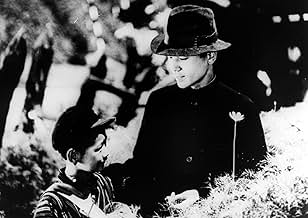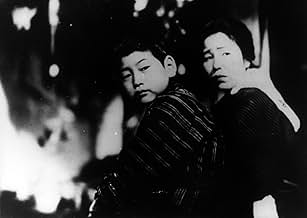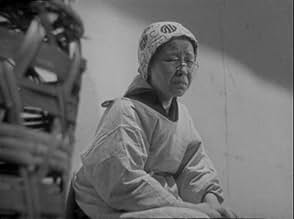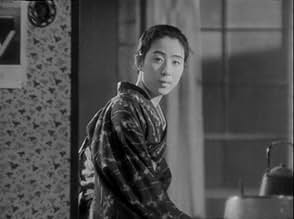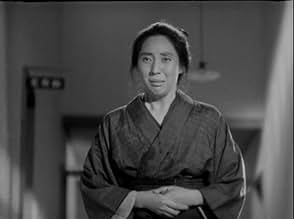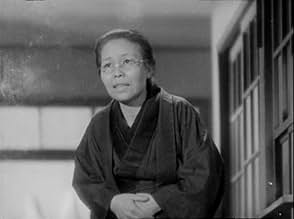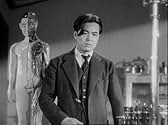VALUTAZIONE IMDb
7,7/10
4341
LA TUA VALUTAZIONE
Aggiungi una trama nella tua linguaA widow sends her only son away to receive a better education. Years later, she visits him, finding him a poor school teacher with a wife and son.A widow sends her only son away to receive a better education. Years later, she visits him, finding him a poor school teacher with a wife and son.A widow sends her only son away to receive a better education. Years later, she visits him, finding him a poor school teacher with a wife and son.
- Regia
- Sceneggiatura
- Star
Jun Yokoyama
- Okubo's son
- (as Bakudan Kozô)
Tomio Aoki
- Tomibo
- (as Tokkan Kozô)
Seiichi Katô
- Kinjo no ko
- (as Seiichi Kato)
Recensioni in evidenza
In 1923, in the province of Shinshu, the widow and simple worker of a silk factory Tsune Nonomiya (O-Tsune) decides to send her only son to Tokyo for having a better education. Thirteen years later, she visits her son Ryosuke Nonomiya (Shinichi Himori), and finds that he is a poor and frustrated night-school teacher with a wife, Sugiko (Yoshiko Tsubouchi), and a baby boy.
"Hitori Musuko" is a poignant, heartbreaking, sensitive and beautiful movie about expectations, frustrations, revelations and hope in life. Once again the major concern of Ozu is with the family and human relationship. In "Hitori Musuko", Ozu brilliantly uses the sound, recent in 1936, in the end of the simple but touching story, when the machines in the factory stop working symbolizing the death of Tsune. I saw this movie in a Brazilian cable television in a copy that certainly needs restoration, and I regret to inform that only "Ohayô" has been released on DVD in Brazil. Only in festivals, and occasionally in cable television, Brazilians have the chance to see the work of this great director. Seeing the number of votes of this masterpiece in IMDb (only 88 votes), I believe that the distribution problem of this film might be international. My vote is ten.
Title (Brazil): "Filho Único" ("Only Son")
"Hitori Musuko" is a poignant, heartbreaking, sensitive and beautiful movie about expectations, frustrations, revelations and hope in life. Once again the major concern of Ozu is with the family and human relationship. In "Hitori Musuko", Ozu brilliantly uses the sound, recent in 1936, in the end of the simple but touching story, when the machines in the factory stop working symbolizing the death of Tsune. I saw this movie in a Brazilian cable television in a copy that certainly needs restoration, and I regret to inform that only "Ohayô" has been released on DVD in Brazil. Only in festivals, and occasionally in cable television, Brazilians have the chance to see the work of this great director. Seeing the number of votes of this masterpiece in IMDb (only 88 votes), I believe that the distribution problem of this film might be international. My vote is ten.
Title (Brazil): "Filho Único" ("Only Son")
"The Only Son" is Ozu's first "talkie" - and utilizes sounds/dialogue in a stylistic manner to tell a simple story. The beautiful simplicity that pervades the piece is classical Ozu, and amplifies the poignant tale of a mother coming back to visit her son, after sacrificing her livelihood to ensure he achieves higher education. When she realizes that he is unsatisfied with his life as a night-school teacher, a general melancholic tone begins to unfold through the progression of the narrative.
There are some fine indoor shots of the house where the son lives, and also, some greatly composed scenes of the run-down industrial neighborhood where the son goes out to buy "noodles" from a nearby stand. What's also memorable about the film is its excellent rendition of outdoor nature shots, one scene stands out in my mind where the son is having a discussion with his mother. There is also a great shot of the night-school teacher looking out dismal and lonely from the school-building to a city sign, which is juxtaposed against a dark, night sky.
The ending is nicely done, and overall, the film is crafted in that spare, simple perfection that is the stylistic hallmark of Ozu's cinema.
There are some fine indoor shots of the house where the son lives, and also, some greatly composed scenes of the run-down industrial neighborhood where the son goes out to buy "noodles" from a nearby stand. What's also memorable about the film is its excellent rendition of outdoor nature shots, one scene stands out in my mind where the son is having a discussion with his mother. There is also a great shot of the night-school teacher looking out dismal and lonely from the school-building to a city sign, which is juxtaposed against a dark, night sky.
The ending is nicely done, and overall, the film is crafted in that spare, simple perfection that is the stylistic hallmark of Ozu's cinema.
Incredibly gentle and touching Ozu picture about a single mother who works her butt off to send her only son off to school. Many years later, we follow her journey to visit that son in Tokyo. He hasn't kept in contact very well. His mother doesn't even know about his wife and infant son, nor that he is a grade school teacher, a rather low (and low-paid) position. Simply put, he's embarrassed at the little he has accomplished and he thinks his mother will be gravely disappointed that she went to so much trouble to educate him. The whole situation really hit home, and I was deeply moved by it. The film also features incredible cinematography and editing.
It's quite striking that although this film was made 17 years before Tokyo Story, all the aspects of the film-making style we have come to associate with Ozu are already fully present. But compare this film with, say, his "Sono yo no tsuma", made just six years earlier in 1930: in that film --- a rather slavish attempt to copy the style of German Realism -- none of the visual and narrative features he shows here are present.
No one has mentioned (so I will...) -- that the German film which Ryosuke takes his mother to see (in which she falls asleep, and of which he self-referentially says "this is what they call a talkie") is Willi Forst's 'Leise flehen meine Lieder' (Vienna, 1933), and the lovely blonde actress seen running through the wheatfields is Louise Ullrich. This film (now largely forgotten) was a popular sensation in Europe at the time, depicting the love affair between Franz Schubert and the Countess Eszterhazy. Also... noticeable in a few scenes in Ryosuke's house is a large travel poster which says 'Germany'. All of which shows the extent to which European film-making was in the mind of the young Ozu. We think of Ozu as a purely "domestic" Japanese director (in every sense of that word), but in fact he was well-versed in the traditions of western film-making.
No one has mentioned (so I will...) -- that the German film which Ryosuke takes his mother to see (in which she falls asleep, and of which he self-referentially says "this is what they call a talkie") is Willi Forst's 'Leise flehen meine Lieder' (Vienna, 1933), and the lovely blonde actress seen running through the wheatfields is Louise Ullrich. This film (now largely forgotten) was a popular sensation in Europe at the time, depicting the love affair between Franz Schubert and the Countess Eszterhazy. Also... noticeable in a few scenes in Ryosuke's house is a large travel poster which says 'Germany'. All of which shows the extent to which European film-making was in the mind of the young Ozu. We think of Ozu as a purely "domestic" Japanese director (in every sense of that word), but in fact he was well-versed in the traditions of western film-making.
The simple story follows Tsune (Choko Iida), a widow and single mother who struggles in a factory job to provide for her son Ryosuke. She sacrifices everything in her own life to pay to send Ryosuke off to the best middle and high schools, toiling away at her thankless job while never getting to see her son. It's not until many years later, when the now-grown Ryosuke (Shin'ichi Himori) gets a surprise visit from his mother at his Tokyo home, that the two assess their lives.
This was Ozu's first sound film, and he can't help but poke fun at the format, with one scene seeing Ryosuke and Tsune attending a "talkie" movie, the old woman's first, only for her to fall asleep during it. But while there are many moments of gentle humor, this is largely a serious affair, taking an unflinching look at familial obligation and expectation. The film asks what the true measure of a man is. Is it financial success, material wealth, a nice home and fat bank account? Or can it be strength of character and generosity of spirit? Ozu doesn't give any definitive answer, and the final sequence of the film leaves the true feelings of Tsune toward her son rather ambiguous.
This was Ozu's first sound film, and he can't help but poke fun at the format, with one scene seeing Ryosuke and Tsune attending a "talkie" movie, the old woman's first, only for her to fall asleep during it. But while there are many moments of gentle humor, this is largely a serious affair, taking an unflinching look at familial obligation and expectation. The film asks what the true measure of a man is. Is it financial success, material wealth, a nice home and fat bank account? Or can it be strength of character and generosity of spirit? Ozu doesn't give any definitive answer, and the final sequence of the film leaves the true feelings of Tsune toward her son rather ambiguous.
Lo sapevi?
- QuizThis was Yasujirô Ozu's first feature film with all-synchronous dialogue.
- ConnessioniFeatured in A Train Arrives at the Station (2016)
- Colonne sonoreOld Black Joe
Written by Stephen Foster
I più visti
Accedi per valutare e creare un elenco di titoli salvati per ottenere consigli personalizzati
- How long is The Only Son?Powered by Alexa
Dettagli
- Tempo di esecuzione
- 1h 22min(82 min)
- Colore
- Mix di suoni
- Proporzioni
- 1.37 : 1
Contribuisci a questa pagina
Suggerisci una modifica o aggiungi i contenuti mancanti

